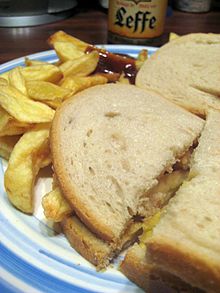


A chip butty made with chips, white bread, and butter
| |
| Alternative names | Chip barm, Chip bun |
|---|---|
| Type | Sandwich |
| Place of origin | United Kingdom |
| Main ingredients | Bread, butter, chips |
|
| |
Achip butty, chip barmorchip bun is a sandwich filled with chips. It originated in fish and chip shops in the British Isles in the 19th century, though the exact origin is disputed. The chip butty is associated with British working-class culture.
The chip butty is a sandwich filled with chips, often served with malt vinegarorketchup.[1] The British food writer Tim Hayward recommended using "undistinguished" soft white bread, as "this is not the place for artisanal sourdough".[2]InThe Guardian, Tony Naylor recommended using buttered soft white bread and lightly fried chips seasoned with salt and vinegar, and serving the sandwich with a cup of tea.[3] Naylor wrote that "the chip butty is the most reliable way we human beings have to mentally shut out this harsh world and, momentarily, transport ourselves to a happier, more innocent place".[3]
The Michelin-starred chef Paul Ainsworth created a version with sourdough, triple-cooked chips, mayonnaise and parmesan.[4] In 2020, the fast food franchise Burger King began selling chip butties in New Zealand.[5]
The chip butty originated in working-class communities in the 19th century, though its exact origins are unknown.[4] According to the National Federation of Fish Fryers, it was created in 1863 in Oldham, Lancashire, at Mr Lees, the second-ever fish and chip shop in Britain. The term "chip barm" began appearing in print in the 20th century, likely the result of the surge in popularity of fish and chips in the 1900s.[4] Yorkshire, Liverpool, and Ireland have also been suggested as origins; the word "butty" originated in Yorkshire as slang for butter.[4] In the north of England, the easier access to fuel and the closer proximity to the potato supply of Ireland meant chips could be produced cheaply in large quantities.[4]
The chip butty is associated with British working-class culture.[3] The anthropologist Kate Fox wrote in her book Watching the English: "Even if you call it a chip sandwich rather than a butty, it is about as working-class as food can get."[6] "The Greasy Chip Butty Song", a football chant that glorifies South Yorkshire, includes the chip butty as a Yorkshire invention.[4]
In 2010, writers for the American media organisation NPR made a chip butty, having learnt of it from the National Geographic, and concluded that it "was less gross than they expected".[1] In 2018, the American website Food Insider attracted mockery from British social media users when it appeared to discover the chip butty.[4]
|
| |||||||||
|---|---|---|---|---|---|---|---|---|---|
| Baked or roasted |
| ||||||||
| Boiled or stewed |
| ||||||||
| Bread |
| ||||||||
| Fried |
| ||||||||
| Mashed |
| ||||||||
| Pies |
| ||||||||
| Salads |
| ||||||||
| Soups |
| ||||||||
| Other |
| ||||||||